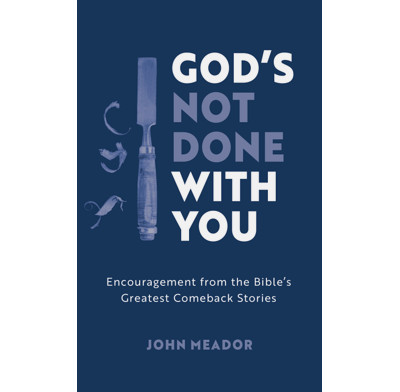The Bible positions David as a man after God’s own heart, and often in his early days, he was an exemplary leader. King David did, however, enter into a season of secret sin and humiliation. Psalm 51 is David’s prayer of response to the exposure of his sin—and it is recorded for all posterity to see and learn from. It is what you have if you take a weeping, grieving, repentant heart, and put it into words. It is an amazingly powerful and vulnerable expression to God. The prayer of Psalm 51 shows us much that we need to know about coming back from sin. It’s marked well in my Bible because I’ve been there many times. Allow me to highlight some principles here...
1. When You Come Back to God, Do it Directly
“Be gracious to me, God, according to Your faithfulness; According to the greatness of Your compassion, wipe out my wrongdoings.” (Psalm 51:1 NASB)
David does not look to a priest or religion as the pathway back. He’s not trying to self-atone or pay a penalty that will free him from sin’s consequences. He knows he has offended God, so he comes straight to God, the Judge and the Forgiver. He appeals to God’s character: specifically to His loving-kindness and compassion.
2. When You Come Back to God, Take Ownership for Sin
Our tendency is to point to the nature of the tempter or the temptation. We cry “foul” when things seem unfair, and we’re reluctant—even stubbornly resistant— to take the blame. There is no healing in blaming others, though. There are no solutions. It deflects. It allows us to dodge responsibility. David's story comes to a turning point when he takes ownership of his sin."
“For I know my wrongdoings, and my sin is constantly before me. Against You, You only, I have sinned and done what is evil in Your sight, so that You are justified when You speak and blameless when You judge.” Psalm 51:3-4 NASB
I did it, David confessed. It was me. David had rejected what he knew about right and wrong. He had rejected what he knew about God. He sat down on the throne of his own desires and sinned. I can get away with this, David thought. And that was an affront to God. At the end of his sin, David was barely recognizable as a man after God’s heart. If you allow sin to cause you to wander, it will make your life unrecognizable. Still, God’s mercy remains. And it’s in that mercy David placed his future.
3. When You Come Back to God, Hope in His Mercy
Forgiveness is not simply being sorry for sin or its consequences. It’s certainly not remorse from simply being caught or embarrassed by our actions. And it’s also not just a wishful hope that God may forget it or let it drop. No, forgiveness is the specific action of a holy God that puts away sin.
- “Purify me with hyssop, and I will be clean.” (v 7)
- “Cleanse me, and I will be whiter than snow.” (v 7)
- “Hide your face from my sins and wipe out all my guilty deeds.” (v 9)
- “Create in me a clean heart, God, and renew a steadfast spirit within me.” (v 10)
Do you see the instigator of the action? It’s all God! David is trusting and believing that God will act as only He can to restore David to a right standing before Him. In this prayer, David is taken from one position (separation) to a completely different place (restoration) by God’s actions. It’s not that David’s sin was without consequence. Even after David repented, he lost the son Bathsheba bore. That’s another story altogether, but even the grief that sinful consequences bring us can be healed by knowing we’re standing in His compassion and grace. It gives us the strength to trust Him for healing. God does restore David to His grace and fellowship, and yes, He even restores him to be king. It’s hard for us to get our heads around just how big this restoration is that God gives.
4. When You Come Back to God, Come Humbly
At the end of David’s prayer, he makes one more statement that reveals his heart so well at this point.
“For You do not delight in sacrifice, otherwise I would give it; You do not take pleasure in burnt offering. The sacrifices of God are a broken spirit; A broken and contrite heart, God, You will not despise.” Psalm 51:16-17 NASB
Psalm 51 is an invitation. It is a call to come back to God the way David came back. Come, along with your sin and your broken heart, and you can be brought back to God.
This article is an adapted excerpt from God’s Not Done with You by John Meador. John has served as a lead pastor for 40 years, most recently at Cross City Church, in Euless, Texas.
Photo Credit: ©Getty Images/FOTOKITA
 John Meador has served as a lead pastor for 40 years, most recently at Cross City Church, in Euless, Texas (in the DFW area) since 2006. The church, with 3,000 active members, is intergenerational and multi-ethnic with ministries from birth to beyond retirement. He and His wife Kim have been married for 44 years and are the grateful parents of six grown children. John loves “real” sports—and enjoys working on and driving around in his old Ford truck. More at www.johnmeador.com.
John Meador has served as a lead pastor for 40 years, most recently at Cross City Church, in Euless, Texas (in the DFW area) since 2006. The church, with 3,000 active members, is intergenerational and multi-ethnic with ministries from birth to beyond retirement. He and His wife Kim have been married for 44 years and are the grateful parents of six grown children. John loves “real” sports—and enjoys working on and driving around in his old Ford truck. More at www.johnmeador.com.